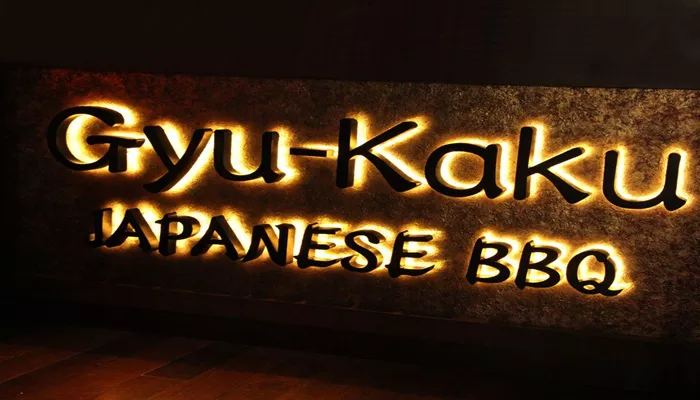The first Gyu-Kaku restaurant in the United States opened in 2001 in Los Angeles, and since then, the brand has grown to over 700 locations worldwide, including more than 50 in North America. Gyu-Kaku’s menu features a variety of marinated meats, seafood, vegetables, and desserts that customers can cook to their liking on specially designed in-table grills. This engaging dining experience has made Gyu-Kaku a popular choice for both casual dining and special occasions.
Gyu-Kaku Brand Introduction
Gyu-Kaku, which translates to “bull’s horn” in Japanese, is a renowned chain of yakiniku restaurants that specializes in an interactive dining experience. Founded in 1996, Gyu-Kaku first opened its doors in Japan and has since expanded globally, establishing itself as the leading yakiniku brand worldwide. The concept revolves around diners grilling their own food at the table, a practice that not only enhances the flavor but also fosters a unique social dining atmosphere.
Gyu-Kaku Franchise Cost
Starting a Gyu-Kaku franchise requires a significant financial investment. The initial costs can vary based on several factors, including location and size of the restaurant. Here’s a breakdown of the primary costs involved:
Initial Franchise Fee: $50,000
Total Initial Investment: Ranges from $791,093 to $2,120,001
Working Capital: Estimated between $10,000 to $15,000
Royalty Fee: 5% of gross sales
Advertising Fee: 1.5% of gross sales
Additional costs may include construction expenses, equipment purchases, grand opening marketing, and ongoing operational costs.
Potential franchisees should also consider the development option fee of $25,000 for each additional restaurant they plan to open under an Area Development Agreement.
see also: Coffee World Franchise
Gyu-Kaku Franchise Conditions
To qualify for a Gyu-Kaku franchise, applicants must meet specific criteria set by the franchisor. These conditions ensure that franchisees are capable of maintaining the brand’s standards and operational practices. Key requirements include:
Financial Stability: Franchisees must demonstrate sufficient financial resources to cover startup costs and operational expenses.
Business Experience: While prior restaurant experience is not mandatory, having a background in business management or hospitality can be advantageous.
Location Requirements: Gyu-Kaku restaurants typically require a space between 3,000 to 4,500 square feet in high-density areas with good visibility and accessibility.
Commitment to Training: Franchisees must complete an extensive training program provided by Gyu-Kaku, which includes both classroom instruction and hands-on training.
Gyu-Kaku Franchise Process
The process of opening a Gyu-Kaku franchise involves several steps:
Initial Inquiry: Interested candidates should reach out to Gyu-Kaku’s franchise development team to express interest and request information.
Application Submission: Candidates must complete an application form detailing their financial background and business experience.
Franchise Disclosure Document (FDD): After reviewing the application, Gyu-Kaku will provide the FDD, which contains essential information about the franchise system.
Interview Process: Qualified candidates will undergo interviews with Gyu-Kaku representatives to assess their fit for the brand.
Site Selection: Once approved, franchisees work with Gyu-Kaku to identify suitable locations for their restaurant.
Training Program: Franchisees must complete a comprehensive training program that covers operations, customer service, marketing strategies, and more.
Opening the Restaurant: After training and site preparation are complete, franchisees can officially open their Gyu-Kaku location.
Gyu-Kaku Franchise Profit
The profitability of a Gyu-Kaku franchise can vary widely based on several factors including location, market demand, and management efficiency. However, there are key indicators that suggest strong profit potential:
Sales Performance: Successful Gyu-Kaku locations have reported average gross sales ranging significantly based on market conditions.
The initial investment correlates with potential revenue; generally, higher investments may lead to higher returns.
Customer Engagement: The unique interactive dining experience encourages repeat business and attracts large groups for celebrations and gatherings.
Brand Recognition: As one of the largest yakiniku chains globally with established brand loyalty among customers, Gyu-Kaku benefits from strong market presence which can drive sales.
Operational Efficiency: With customers cooking their own meals at the table, Gyu-Kaku restaurants require fewer kitchen staff compared to traditional restaurants. This can lead to lower labor costs while maintaining high service levels.
Conclution
In summary, investing in a Gyu-Kaku franchise presents an exciting opportunity for entrepreneurs interested in the restaurant industry. With its unique dining concept and established brand reputation, Gyu-Kaku offers potential franchisees a chance to tap into a growing market while enjoying support from a well-organized franchisor.
Related topics:
- Fizz Café Franchise Costs, Profit & Requirements For 2024
- Thai Express Franchise Costs, Profit & Requirements For 2024
- Yummy Tummy Franchise Costs, Profit & Requirements For 2024

